Things Your Writing Teacher Never Told You: Columbia College Chicago Alumni Fantasy Writers Look at the Changing Role of Heroes in Terry Pratchett’s Troll Bridge Film
Troll Bridge, Snowgum Films (2019)
The air blew off the mountains, filling the air with fine ice crystals.
It was too cold to snow. In weather like this wolves came down into villages, trees in the heart of the forest exploded when they froze. In weather like this right-thinking people were indoors, in front of the fire, telling stories about heroes.
This is the epic, atmospheric opening to Sir Terry Pratchett’s marvelous short story, “Troll Bridge,” set in his Discworld series.
As I write this, it is not too cold to snow, though it’s much too nasty to be outside. The wind is howling and the snow is blowing, and here in Chicago they’ve predicted we’ll get a foot of snow in 48 hours. Texas looks like the Midwest in winter, and there’s damned few snowplows in the Lonestar state. A whopping 80% of the US currently has snow on the ground.
In past winters, I have seen coyotes slinking around the park a block from our condo building, and one glorious Yuletime night, I saw a 10 point buck, antlers coated in ice, standing in the middle of Michigan Ave, on the Magnificent Mile. It was an icy, wind-whipped night, the type where the snow turns everything it touches into a glowing icicle. Only the buck and I were foolish enough to be out that night. That was 30 years ago, and I remember it clearly to this day.
As the wind howls past my window tonight, it takes little imagination to think packs of wolves might be coming down from the wilds of Wisconsin to stalk through the streets of Chicago.
As foolish as it may be to brave the elements at their worst, that isolation sets up a mythic encounter. There’s no guarantee of survival for the foolish. That is one of the things that makes it mythic.
Perhaps you know, or perhaps you’re hearing now, as you sit inside with warm slippers and a hot toddy, that “Troll Bridge” has finally been turned into a wonderful short film; that it’s a visual marvel that combines live acting, CGI, and animation to perfection; and that the sound and music is epic.
The half-hour film is very faithful to the short story. While I haven’t done a side by side comparison of the story to the film to figure out what — if any — text or dialogue was changed, I’ve consumed both this week, and can’t point to a moment where they differ… other than the song that plays over the end credits. It is absolutely the perfect sequel to the story and is as funny and whimsical as Pratchett’s story itself. The film was screened at festivals and fan conventions in 2019. It was officially released to YouTube just recently.
If you haven’t read the story, Black Gate‘s Bob Byrne did a terrific synopsis in his BG post “Pratchett’s Cohen the Barbarian.”
Here’s a snippet of that.
Cohen has come to defeat a bridge troll in single combat because decades ago, his father told him that he should. But Cohen finds a troll who is thrilled to meet the legendary fighter. Micah introduces his wife and kids. Poor Micah: his three troll brothers-in-law have found success as a merchant, a lumber mill owner and a bridge toll taker. His wife nags him constantly about their life, living under a leaky old bridge that nobody crosses anymore. He is proud of the job his father held before him and that he will pass on to his son. An unchanging troll in changing times.
Instead of a deadly combat, Cohen and Micah reminisce about how it used to be in the old days. Now, it’s all so civilized. Cohen laments that there aren’t forests filled with giant spiders or goblins attacking all over the place. This short story tells us what we learn about Cohen in the novels: his time has passed and he doesn’t know what to do.
I taught the Fantasy Writing Workshop at Columbia College Chicago for 10 years. We always read this story the last day of the semester. I can’t really count how many times I’ve read the tale: for fun, for teaching prep, out loud in class. I’ve lived with the story a long time. As I get older, and as our world sees dramatic changes in social movements and politics, I love the story as much as ever, but I see the themes in different lights.
I can empathize with Cohen and Micah as I get older and things seem to change so fast I can’t keep up. I can empathize with Beryl, and the horse, as my husband retired three years ago from broadcast journalism. I watched with him as the journalism world changed and parts died off, or nearly so, as he edged toward retirement. But I can also step out of the story, and perhaps look at it with the critical eye of Adora Belle Dearheart, another character from Pratchett’s Discworld, the love of Moist von Lipwig. She is cynical, more than a little angry, and a progressive feminist who has no patience left for the patriarchy.
Pratchett once said in an interview that the story was “about the end of adventure.” And it is about the end of the adventures of sword-wielding alpha warriors and their epic battles with the dragons, trolls, and orcs they slay. This story can easily be seen as a commentary about the very necessary end of colonialism and the crumbling of the patriarchy. It draws strong parallels to the historical cultural battle here in the U.S. of cowboys who roamed the wide open country giving way to farmers and their damned fences.
Despite the frothy tone of the song “Don’t Fence Me In,” sung by the likes of Roy Rogers, Gene Autry, and even Bing Crosby, it is the same plaintiff wail.
Roy Rogers
Give me land, lots of land under starry skies above
Let me ride through the wide open country that I love
Let me be by myself in the evenin’ breeze
And listen to the murmur of the cottonwood trees
Send me off forever, but I ask you please
Don’t fence me in.
These are all men who were used to having the freedom to roam about conquering things and being hailed as a hero when they wandered back into civilization. But now, there are no more darksome forests with giant spiders, there are no wide open plains to run the cattle. There is Civilization. There are rules. There are fences. For most of us, our lives have been improved by civilization. We no longer need that kind of hero. Unlike the bad old days, we can’t just send our warriors off to conquer another country or instigate a Holy Crusade just to keep the modern-day Templars busy so they don’t stir up trouble at home.
In the U.S, with the Women’s Marches, the Black Lives Matter marches, the recent insurrection at the Capitol Building, the second impeachment trial, and the GOP backlash against the handful of Republicans who voted to impeach the ex-president, it is an interesting time to think about the changing face of heroes.
So I’ve asked a number of my former Fantasy Writing Workshop students, who are writing or editing in the fantasy field, to read the story again, watch the film, and share some of their thoughts with me.
Maria Schrater, a 2018 graduate, said,
One of my favorite things about Terry Pratchett’s work is you always feel like the world is moving around you. All stories are about something happening, but he catches the Discworld on the cusp of industrializing, and how that brings immense and awesome progress (like the clacks and railway) and also strips the world into commodified pieces. There is no room for old-fashioned sword-bearing heroes in that era — it doesn’t need them anymore. If Cohen the Barbarian rode into Ankh-Morpork swinging his sword and looking for trolls to defeat, Sam Vimes would arrest him before the first intersection.
A new set of rules falls into place, where the lore of the forest becomes the hypnotic mythology of technology. Old heroes, with their legends calcified, can’t adapt in the public consciousness, so new ones must arise. That may sound bittersweet, but I think it’s fantastic — it’s always giving us room to remember the old and imagine something better.
Maria Schrater
Schrater received the 2018 Certificate of Merit in Humor from Columbia Scholastic Press Association (not affiliated with Columbia College Chicago), she’s had poetry published at SycoraxPress.com, and has a story out in the new Wild Hunt anthology, No Iron in Eden (Air & Nothingness Press).
The Wild Hunt (Stories of the Chase)
Some, like Alexandria Baisden, a 2016 graduate, liked the blend of humor and melancholy — a difficult mix to do right.
Alexandria Baisden
The humor blends with the story’s melancholy tone. It achieves this perfect feeling of what nostalgia is supposed to feel like — this bone-deep, wistful warmth mixed with yearning from what you’ve lost. I enjoyed Cohen the Barbarian as a character. A grumpy old warrior who still has a thirst to prove himself and has seen more than his fair share of battle and adventure.
Ethereal Enigma
Baisden’s most recent publication is Ethereal Enigma, a visual novel out on Steam. Her fiction and poetry have already garnered a number of awards and nominations, including: “The Scarecrow’s Lover,” nominated for the 2020 Rhysling Award (Abyss & Apex), “Don’t Ask an Anglerfish to Smile,” nominated for 2020’s Best of the Net (Corvid Queen), and “The Old Man and the Phoenix,” which won Apex Magazine’s Story of the Year in 2016.
She adds, “Also, I adored the talking horse. Talking horses are always good in my book.”
She, like me, often writes about anthropomorphised creatures. She’s much too young to know about Wilbur’s Mr. Ed, the talking horse, even with Nick at Night, but Sir Terry wasn’t. And I think Cohen’s horse would get along just fine with Mr. Ed.
Mr Ed (and Wilbur)
Not surprisingly, Aja Todd, a 2019 graduate, was also drawn to the horse, and the societal role he gave voice to.
Aja Todd
The pair of characters I find most relatable would be the horse and Cohen the Barbarian. Over the last five years, I’ve noticed two strong trends within most young adults (18-25). The first trend is a growing need for escapism, shown on various social media platforms and seen in ever-increasing viewership of streaming sites (Hulu, Netflix, etc.). The second is a begrudging reminiscence of “what was before,” with the consumption of old media that no longer airs, and the rise of revival or sequels to past successes.
The former can be represented by the Horse. He has a consistent laidback nature to his surroundings, and requests repeatedly to do something different (e.g. going to a beach, a dramatic contrast to Troll Bridge’s scenery). The latter is represented by Cohen the Barbarian and his reaction to his conversation with the Troll about their past. Although Cohen the Barbarian and the Troll are similar in their desires for tradition, Cohen the Barbarian eventually goes with the changing tide by letting the Troll live, while the Troll remains on the bridge despite his family’s request.
It’s very difficult to be an old-fashioned hero and balance the desire to go hit things with swords or clubs with the needs and desires of a wife and kids. Cohen has difficulty just dealing with his talking horse! Of course, there are some interesting stories about just that sort of awkward juggling of heroics and homelife. Witness the 2005 movie Mr. and Mrs. Smith. While some might quibble whether assassins count as heroes, trolls, giant spiders, orcs, and other races would more likely call Cohen an assassin than a hero. It really is all in the point of view.
Mr. & Mrs. Smith (20th Century Fox, 2005)
Todd said,
Troll Bridge is a perfect representation of what occurs in the art of storytelling. Classics like Cohen the Barbarian used to be hailed by audiences. Familiar storylines, well-known tropes — its former reception created a rise of interest in these adventures, similar to how Cohen was known by the Troll as a legend. However, time progresses and glory fades. Those who live in the present, like the Troll’s wife and child, have no interest in the same repeated story. Now there is the need for subversion, a refreshing twist to the old. New stories can’t always rely on tradition or tropes. New stories need Cohen to give gold to the Troll instead of slay him. New stories need a laugh toward the memories, but with a path toward an unfamiliar, exciting future.
Todd’s fiction has appeared in Columbia College Chicago’s multi-award-winning Hair Trigger anthologies. She worked at Cleaver Magazine as an editorial intern in Spring 2020, and continues as one of their fiction editors and social media coordinators.
Norma Desmond (from Sunset Boulevard)
I’m reminded of Sunset Boulevard, with both the Troll and Cohen in the Norma Desmond role.
Joe Gillis, a struggling screenwriter, says,
“You’re Norma Desmond. You used to be in silent pictures. You used to be big.”
She declares, “I am big. It’s the pictures that got small.”
Both the Troll and Cohen have out-lived their usefulness. The “old gods do new jobs” philosophy that runs throughout Pratchett’s Discworld novels is at play here, too. The Troll’s rude but successful brothers-in-law have moved with the times. Is it admirable or sad for epic heroes to stay true to their ethos when the world has passed them by? But where do they go, what do they do now?
John Wayne in The Shootist
I’m reminded of the John Wayne movie The Shootist that opens with this narration.
His name was J.B. Books, and he had a matching pair of 45’s with antique ivory grips that were something to behold. He wasn’t an outlaw. The fact is for a while he was a lawman. Long before I met Mr. Books, he was a famous man. I guess his fame was why somebody or other was always after him. The wild country had taught him to survive. He lived his life and herded by himself.
When you’ve always been a loner, do you have the ability to fit into a changing society? It’s an understated point of Troll Bridge that Cohen has gone there to die fighting the Troll in one last epic battle, just as John Wayne’s character gets into a shootout he knows he’ll lose. He wants to lose, because he’s dying of cancer. Both wanted mythic deaths. Cohen was cheated of his, but found another few quests to go on, relieving those rude troll brothers-in-law of their money.
Jessica C
Another of my former students Jessica C. also picked up on those themes.
The line it is drawn, the curse it is cast
The slowest now will later be fast
As the present now will later be past
The order is rapidly fadin’
And the first one now will later be last
‘Cause the times, they are a-changin’— Bob Dylan, Nobel Prize winner for Literature
Bob Dylan
Bob Dylan’s words are on the edges of my consciousness as I question, how many heroes in their prime plan for retirement? Getting old was never part of the plan for our hero. Realizing the changes, Cohen is using the reserve of his strength to do something that’s been swirling around his head ever since his dad kicked him out the village.
“Defeat a troll in single combat-then you can do anything,” he’d been told. The battles of yesteryear are no longer as sharp in our hero’s mind as the final decree set by his father. Cleansing the land of ferocious creatures, clearing miles of danger so normal folk could have a chance at building and enjoying what the future held.
Now, the ol’ back acts up, dizzy spells are more frequent — and our hero must wrap his knees to keep the creak and rattle out the air whilst stalking his opponents. Cohen set out knowing today could be his last and desired a hero’s death.
“You ought to expect a Troll under a bridge like this,” he explained with his hands in the air and the shard of Cohen’s blade at the back of his neck. “There’s always been a Troll under this bridge.” The persistence of this father troll’s statement — mingled with Cohen’s own reflection of the deforestation of Cut Shade forest — pulled the nostalgia ever more for me. In this world of ever-changing moments there are still staples that we’ve come to expect, and for our hero, 12 pieces of gold wasn’t enough to pay for the knowledge he’d gained: the promise of solidifying principles into purpose in a world of ever-changing seasons.
Jessica C maintains an active YouTube channel, as Lady J. Charmaine (Sybermom), heavy on video-game how-tos. She has a daughter, and has been working with kids for twenty years.
I think one of the reasons Pratchett tends to resonate with audiences of all ages and diversity is that he weaves in the viewpoints of many supernatural ethnicities, cultural backgrounds, social classes, character ages, and complex social issues without getting preachy or taking sides.
These deeper issues are told through a lens of humor. It’s hard not to compare Pratchett’s work, and this story and movie in particular, to Monty Python’s Holy Grail.
Monty Python and the Holy Grail
Keith Ryan Kappel, a 2011 Columbia fiction graduate, says,
Setting aside the sheer Monty Python-esque fun and Pratchettishness of a trollish domestic squabble interrupting what should really be an important battle, Troll Bridge is a charming, classic deconstruction of the classic sword and sorcery genre.
Today, it also reminds us of two seemingly paradoxical things that resonate in this divided era. First, that some forces, like the aged Cohen the barbarian, are willing to break any and all cultural norms in their wistfulness for a nostalgic, fictional past that held horrors for the less privileged.
Second, it reaffirms that really all sentient beings are people with lives and motivations that are easy to ‘otherize’ by making them out to be some sort of monster, and just because society puts us at odds with them, [but] it’s probably their brothers-in-law using dwarf labor to tax a city bridge or replant a perfectly darksome forest with spruce trees, that are your true enemies.
Kappel is a Contributing Writer to Fantasy Flight Games’ Star Wars Role-playing Game.
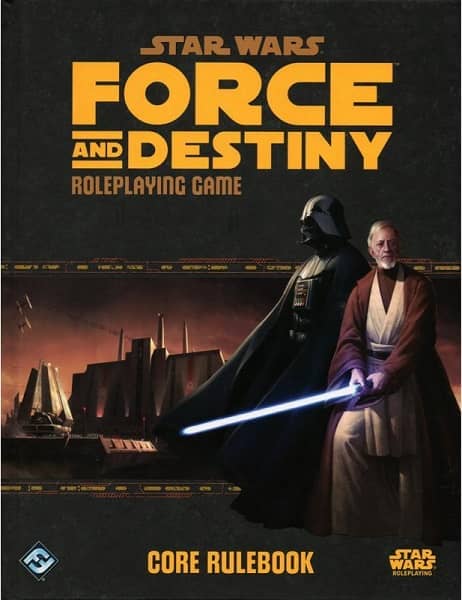 |
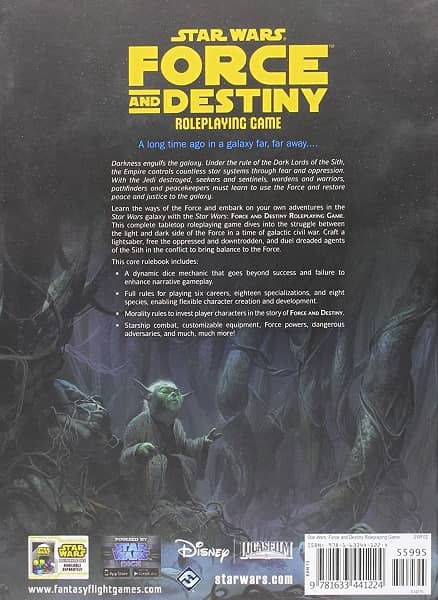 |
Star Wars: Force and Destiny core rulebook
It’s a passing issue that doesn’t get belabored, but Cohen, his horse, and the Troll all basically point out that many of the natural resources and creatures, such as the darksome forest with the giant spiders, are gone, because Cohen (and perhaps other members of his Silver Horde of aging heroes that appear in the books) has destroyed the creatures who lived there, making it possible for the troll brother-in-law to chop down all the ancient trees, sell the wood off, and replant it with spruce trees.
Danny Devito in Other People’s Money (Warner Bros, 1991)
Along with having a sudden urge to send donations to environmental groups, I’m reminded of Danny Devito’s speech in Other People’s Money.
You know, at one time there must’ve been dozens of companies makin’ buggy whips. And I’ll bet the last company around was the one that made the best goddamn buggy whip you ever saw. Now how would you have liked to have been a stockholder in that company? You invested in a business and this business is dead.
The world has changed.
Red Sonja (MGM/UA, 1985)
Tazmania Hayward, a Creative Writing 2019 graduate of Columbia, says,
One of the best parts of the story is how utterly useless the traditional sword and hero is. Not all problems require violence as a solution.
The notion of the ‘sword’ and ‘hero’ has been a trope only white males have the luxury of enjoying. Recently we are getting more females, but it’s still grounded in the white male trope.
Young Cohen got to go around killing people and monsters cause he thought they were bad. But for the trolls, and monsters, and dragons, it’s Cohen — and the farmers — who are the monsters. For blacks, it’s those who cling to the false ethnicity of ‘white’, which pushes anyone who isn’t, into that ‘less than’ category. For women, it’s men who pretend to understand and know what it means to be a woman, forcing them into that ‘less than category’. For killer whales robbing fishing boats, it’s the humans stealing and eating up all the fish from the ocean, once again forcing them into that ‘less than’ category.
Hayward said,
I don’t want to say the definition of the ‘hero’ is changing. That’s too… sterile, tame. It doesn’t capture the true meaning of what’s happening. The definition of the ‘hero’ is being rewritten. Anyone can be a hero, literally anyone. I just hope, with this redefining of the trope, we acknowledge who the villain really is, and not what the old trope has dictated it be.
Uncanny Magazine, Jan/Feb 1991. Cover by Nilah Magruder
Hayward is a submission editor for Uncanny Magazine. She’s also working on a novel while freelancing as a genre, technical, and creative editor.
She said,
If I am drawing a parallel between Troll Bridge to real life events, why should I, someone faced with oppression on a daily basis, be afraid of this world dying out? This world is so unfair, and sexist, and racist, and homophobic, and transphobic, and damaging to the environment essential to our survival, and all around imperfect. More people are hurting less as that world dies. With Cohen and the Troll’s world dying, mine is finally beginning. It’s bittersweet for them, but for me, I’m thinking, ‘Yes! It’s finally my turn!’
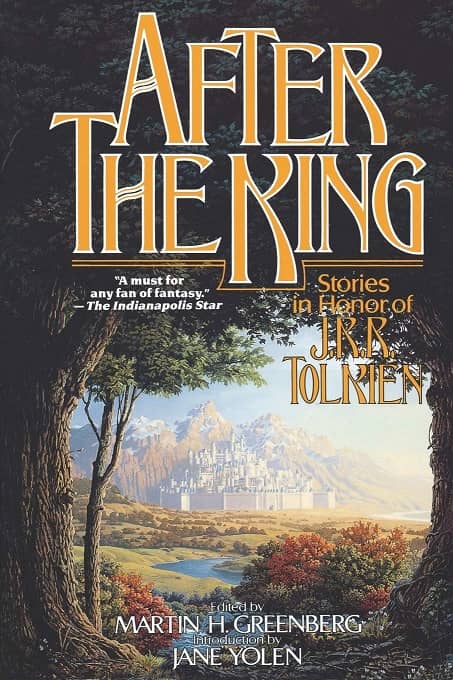 |
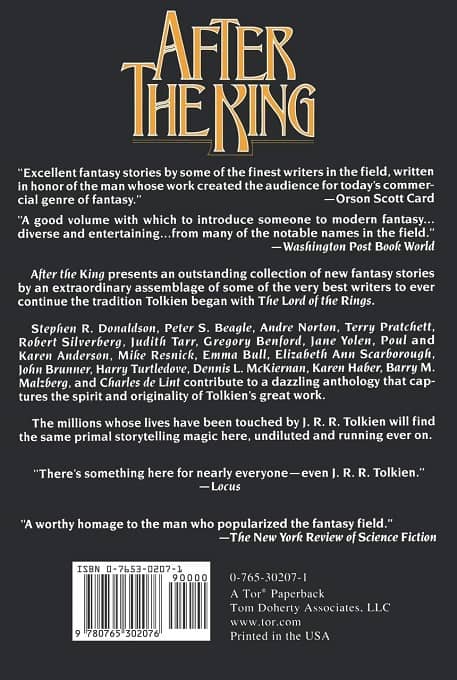 |
After the King (Tor Books, 1992). Cover by Keith Parkinson.
Sir Terry wrote the story in 1991 for the anthology After The King: Stories in Honour of J.R.R. Tolkien. It was later reprinted in The Mammoth Book of Comic Fantasy, which, anecdotally, appears to be where most fans first encountered it.
The Mammoth Book of Comic Fantasy (Carroll & Graf, 1998). Cover by Julek Heller
Snowgum Films’ creative minds have been involved in numerous Pratchett adaptations for stage, LARP, and film in Australia. They began working on the short film circa 2004. In 2011, they started crowd-funding the Troll Bridge film, after they ran out of other funding options.
While I don’t know if they managed to crowd-fund the rest of the money they needed, or if Cohen forked over some of the money from the troll brothers-in-law, however it was bankrolled, I’m glad it got made. Make yourself a hot toddy and enjoy the short film while the winter does its worst outside.
The air blew off the mountains, filling the air with fine ice crystals. It was too cold to snow. In weather like this wolves came down into villages, trees in the heart of the forest exploded when they froze. Except there were fewer and fewer wolves these days, and less and less forest.
In weather like this right-thinking people were indoors, in front of the fire.
Telling stories about heroes.
Tina has blogged previously about Terry Pratchett and his use of a Folksy Narrator in Part 10 of her Point of View series.
Other blogs by Tina you might enjoy:
The 9 Aspects of Story Promise
A Look at How Peter Straub Crafts His Opening Chapters
Researching the Tropes
Seven Common Approaches to Stories That Use Mythology, Fairy Tales & Other Established Source Material
It Was Only A Dream…
Story in Its Many Forms
When the Form Is the Story
The Skeleton Matters (Or, Why It’s Not OK to Skip Scenes in Your Third Act)
Character Profile Sheet — Revised
The Many Faces of Bob Weinberg
Getting to Know Your Omniscient Narrator
Tina L. Jens is a 2017 Rubin Family Fellowship recipient for a residency at the Ragdale artists retreat. She has been teaching varying combinations of Exploring Fantasy Genre Writing, Fantasy Writing Workshop, and Advanced Fantasy Writing Workshop at Columbia College-Chicago since 2007. The first of her 75 or so published fantasy and horror short stories was released in 1994. She has had dozens of newspaper articles published, a few poems, a comic, and had a short comedic play produced in Alabama and Florida and two others chosen for a table reading by Dandelion Theatre in Chicago. Her novel, The Blues Ain’t Nothin’: Tales of the Lonesome Blues Pub, won Best Novel from the National Federation of Press Women, and was a final nominee for Best First Novel for the Bram Stoker and International Horror Guild awards.
She was the senior producer of a weekly fiction reading series, Twilight Tales, for 15 years, and was the editor/publisher of the Twilight Tales small press, overseeing 26 anthologies and collections. She co-chaired a World Fantasy Convention, a World Horror Convention, and served for two years as the Chairman of the Board for the Horror Writers Assoc. Along with teaching, writing, and blogging, she also supervises a revolving crew of interns who help her run the monthly, multi-genre, reading series Gumbo Fiction Salon in Chicago. You can find more of her musings on writing, social justice, politics, and feminism on Facebook @ Tina Jens. Be sure to drop her a PM and tell her you saw her Black Gate blog.
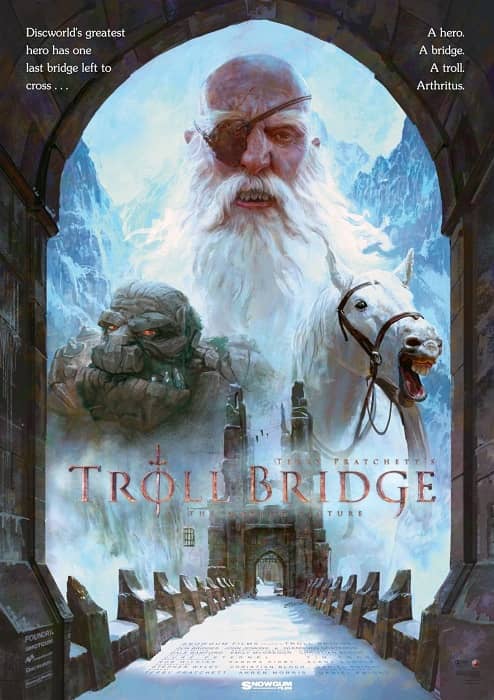
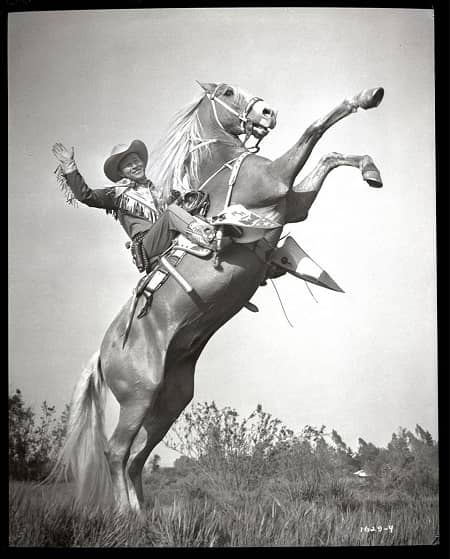

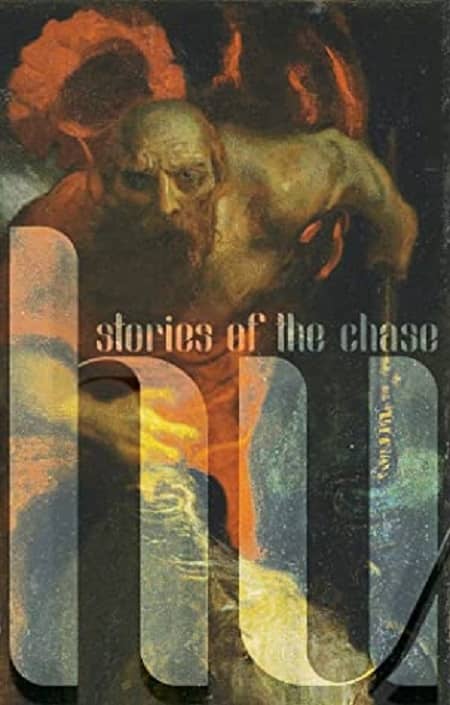

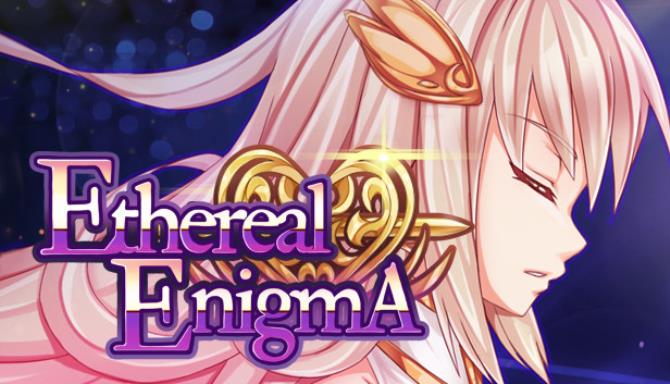
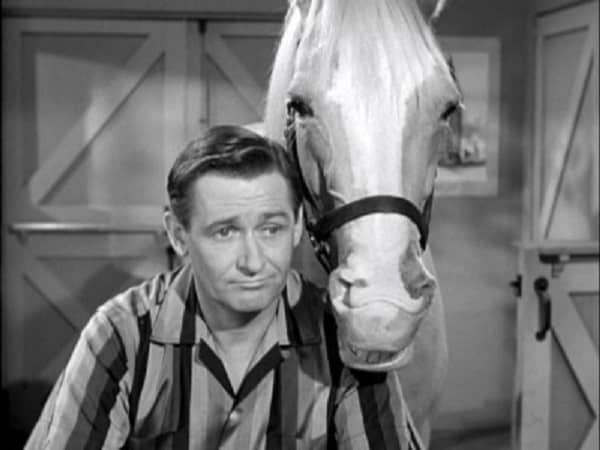

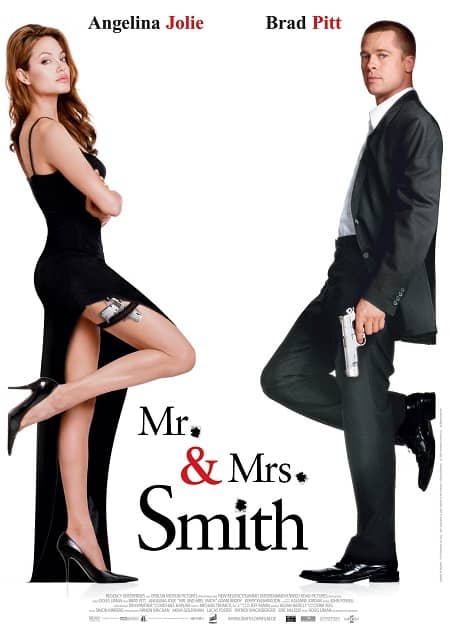

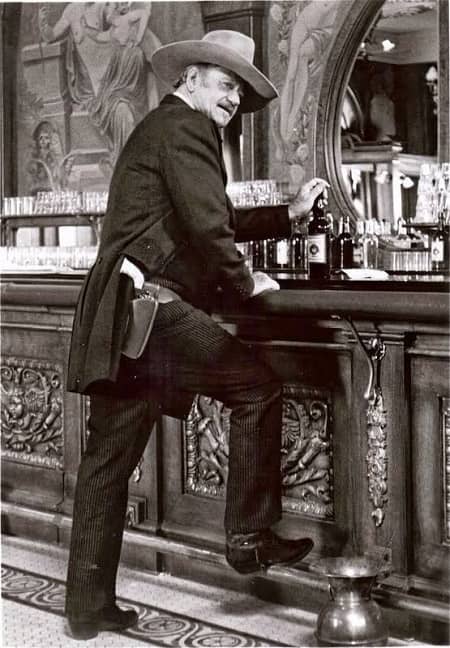

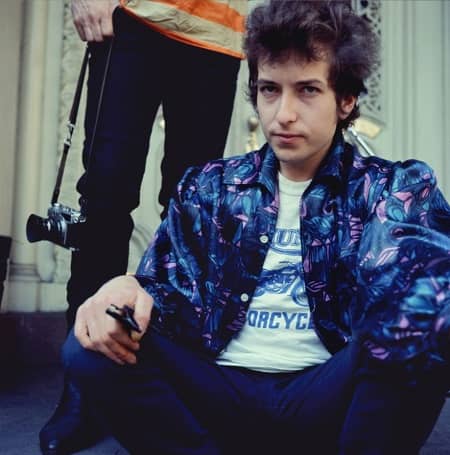
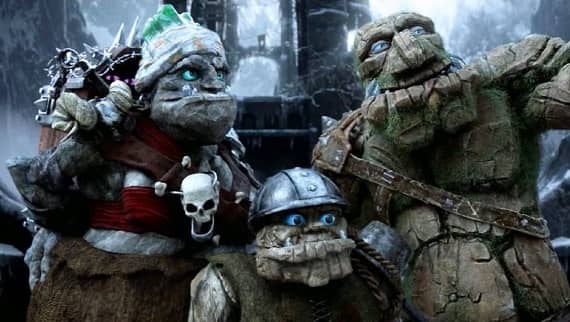
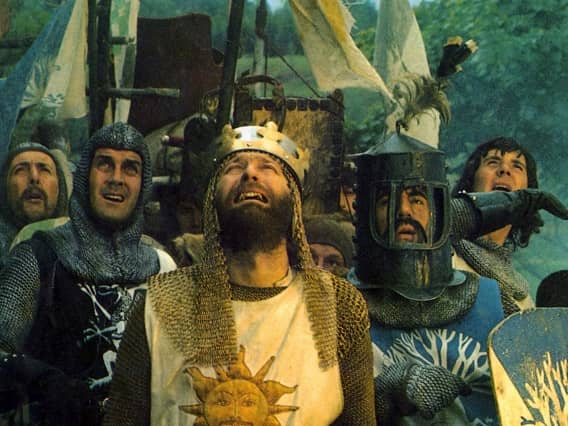
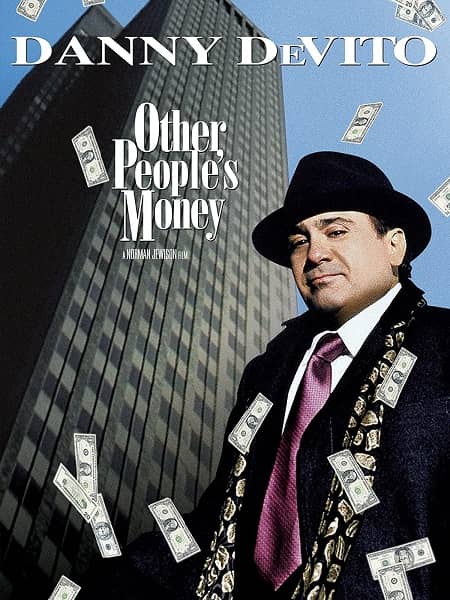
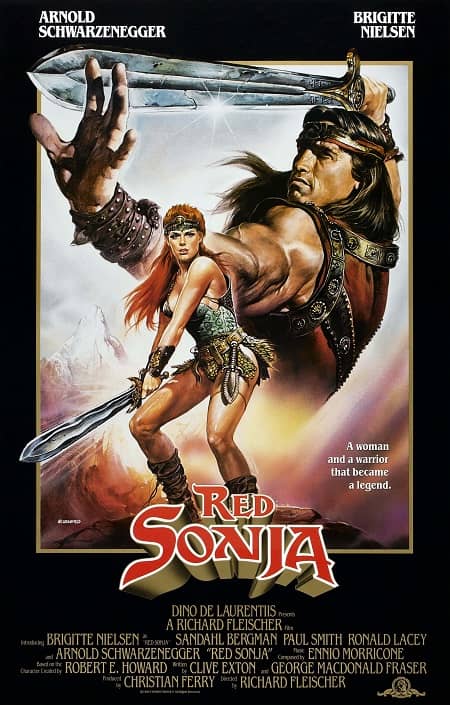
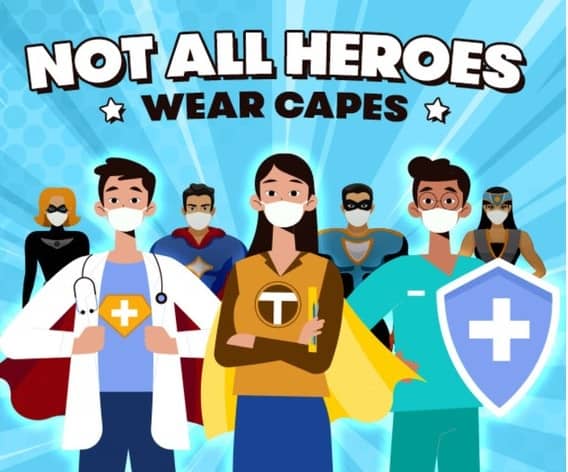
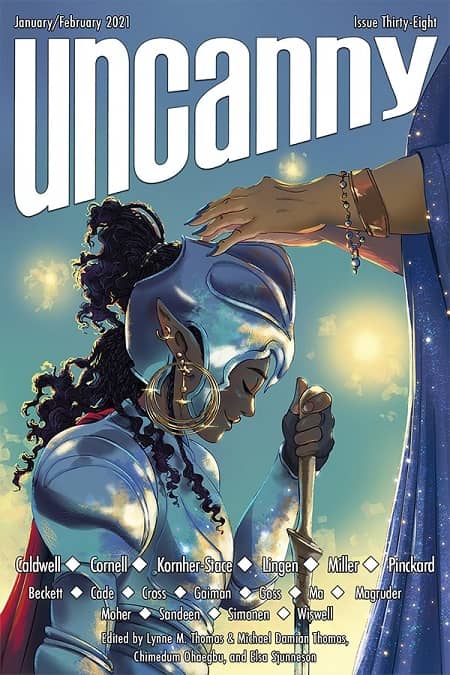
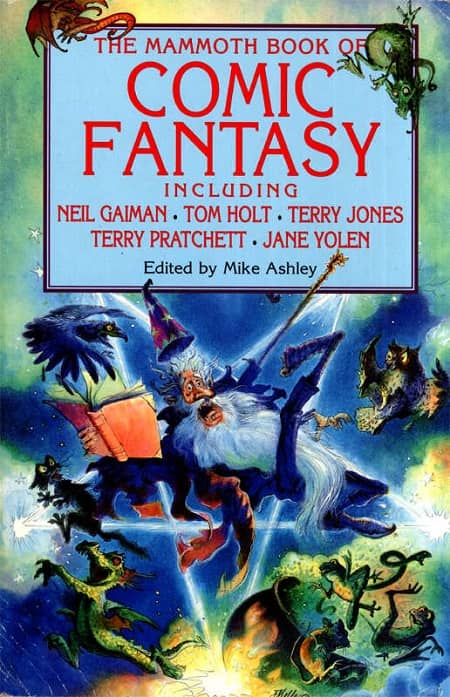
I saw the film at the Dublin Worldcon in 2019, and the audience just adored it. I think that the term “wistful” is the one that came to my mind to describe its tone. I like the examination of the “retirement” of a hero, in that there really is none, aside from “the big sleep”. Which is why I always liked the 2nd part of Beowulf more than the more well-known 1st part, as the aged Beowulf going off to face the dragon knows that he is not likely to return in triumph this time and that he has no way to honorably refuse the quest. Cohen the Barbarian fares a bit better, or at least we can hope so, but it ain’t what it used ta be!